

Intro to Classical Music. What is classical music?
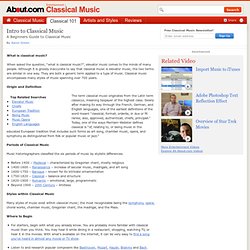
When asked the question, “what is classical music?” , elevator music comes to the minds of many people. Although it is grossly inaccurate to say that classical music is elevator music, the two terms are similar in one way. They are both a generic term applied to a type of music. Classical music encompasses many styles of music spanning over 700 years. Origin and Definition The term classical music originates from the Latin term classicus, meaning taxpayer of the highest class. Periods of Classical Music Music historiographers classified the six periods of music by stylistic differences. Before 1400 – Medieval – characterized by Gregorian chant, mostly religious 1400-1600 – Renaissance – increase of secular music, madrigals, and art song 1600-1750 – Baroque – known for its intricate ornamentation 1750-1820 – Classical – balance and structure 1820-1900 – Romantic – emotional, large, programmatic Beyond 1900 – 20th Century – limitless.
Classical Music for Children. 4.
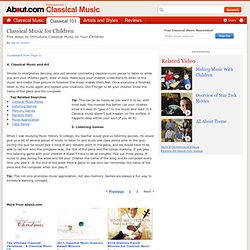
Classical Music and Art Similar to interpretive dancing, pick out several contrasting classical music pieces to listen to while you and your children paint, draw or color. Make sure your children understand to listen to the music and create their picture to however the music makes them feel. Once everyone is finished, listen to the music again and explain your creations.
Don’t forget to let your children know the name of the piece and the composer. Tip: This can be as messy as you want it to be; with most kids, the messier the better. 5. When I was studying Music History in college, my teacher would give us listening quizzes. Tip: This not only promotes music appreciation, but also memory. Most Influential Classical Music Composers. Largely different from Baroque music which was mostly flamboyant, new music styles during the Classical period had simpler harmony and clearer tonality.
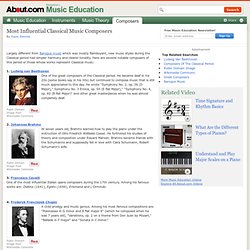
Here are several notable composers of this period or those whose works represent Classical music: 1. Ludwig van Beethoven Public Domain Image from Wikimedia Commons One of the great composers of the Classical period. 2. At seven years old, Brahms learned how to play the piano under the instruction of Otto Friedrich Willibald Cossel. 3. One of the most influential Italian opera composers during the 17th century. 4. A child prodigy and music genius. 5. A conductor, teacher and composer whose works reflected different influences; from American folk tunes to Brahms' works. 6. From Wikiemedia Commons A composer during the Classical period especially known for his operas and for reforming the operatic styles of that era. 7.
Public Domian Portrait (Source: www.vanslageren.nl) History of Classical Music - Eras. This is the first period where we can begin to be fairly certain as to how a great deal of the music which has survived actually sounded.
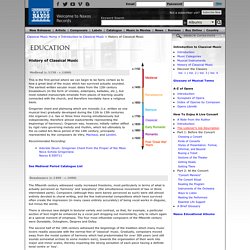
The earliest written secular music dates from the 12th century troubadours (in the form of virelais, estampies, ballades, etc.), but most notated manuscripts emanate from places of learning usually connected with the church, and therefore inevitably have a religious basis. Gregorian chant and plainsong which are monodic (i.e. written as one musical line) gradually developed during the 11th to 13th centuries into organum (i.e. two or three lines moving simultaneously but independently, therefore almost inadvertently representing the beginnings of harmony). Organum was, however, initially rather stifled by rigid rules governing melody and rhythm, which led ultimately to the so-called Ars Nova period of the 14th century, principally represented by the composers de Vitry, Machaut, and Landini.
Recommended Recording: Recommended Recordings: Classical Composer - a - Page 1. History of Music. As of July 1, 2013 ThinkQuest has been discontinued.
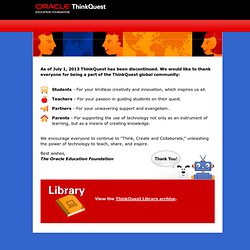
We would like to thank everyone for being a part of the ThinkQuest global community: Students - For your limitless creativity and innovation, which inspires us all. Teachers - For your passion in guiding students on their quest. Partners - For your unwavering support and evangelism. Parents - For supporting the use of technology not only as an instrument of learning, but as a means of creating knowledge. We encourage everyone to continue to “Think, Create and Collaborate,” unleashing the power of technology to teach, share, and inspire.
Best wishes, The Oracle Education Foundation. Classical music classical musicians.